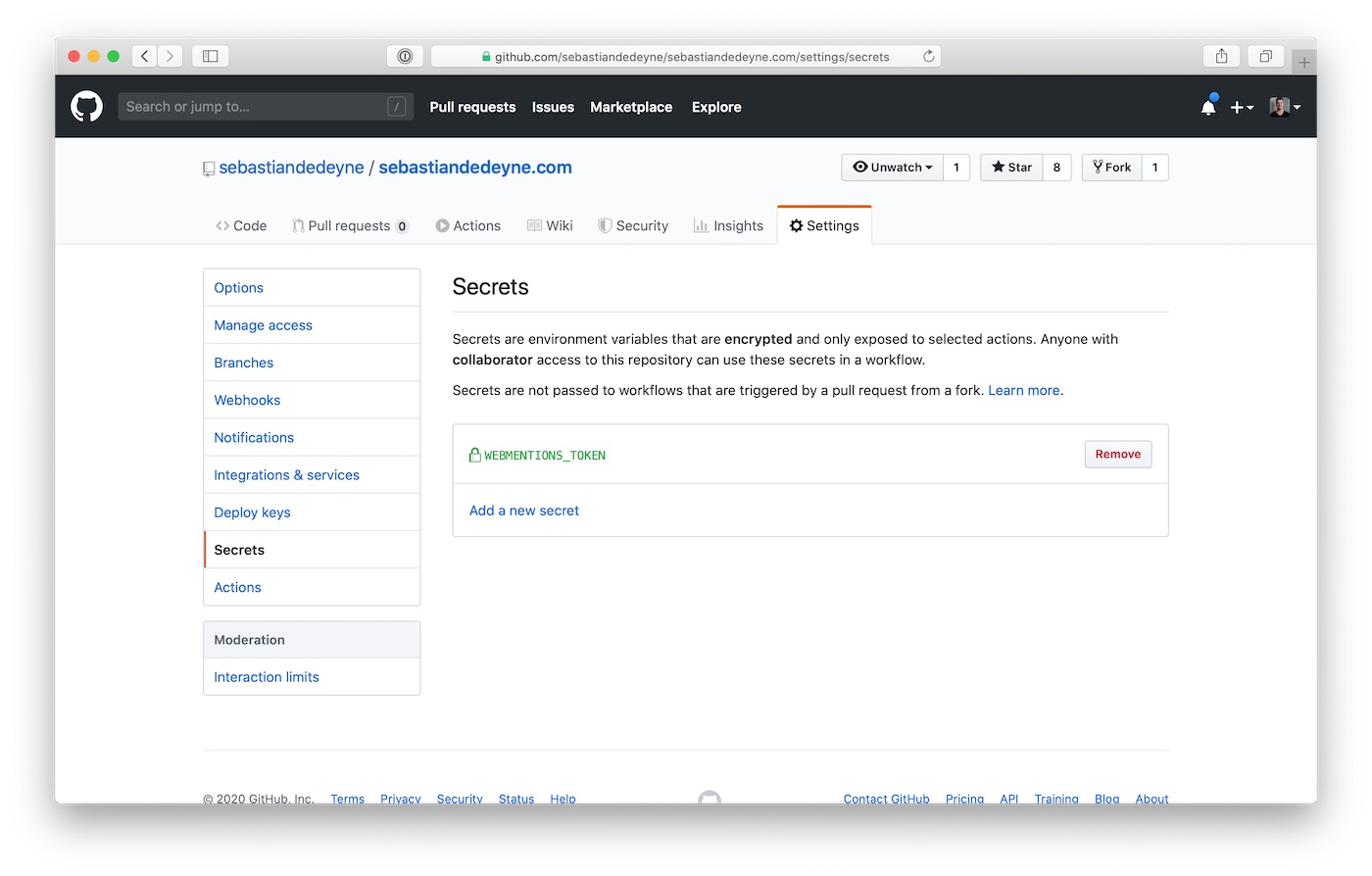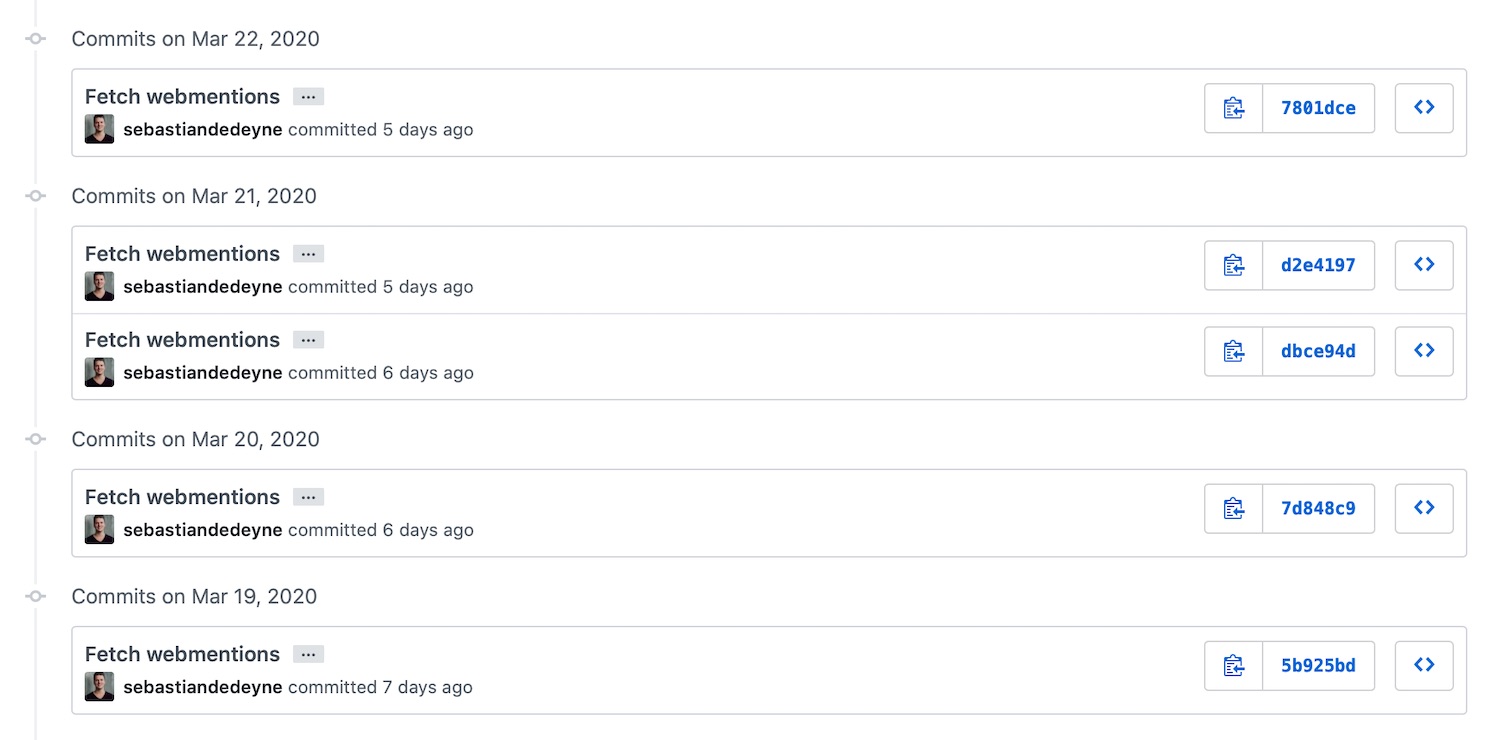Webmentions on a static site with GitHub Actions
Last year, I added webmentions to this blog. To recap, webmentions are a web standard to create a network of comments, likes, and reposts between ordinary sites. I set up a brid.gy account to poll Twitter for webmentions targetting my blog, and I caught them with webmention.io.
Webmentions were fetched with AJAX and rendered at the bottom of each page. There were two things I didn't like about this approach:
- I'd rather just have them prerendered by Hugo, my static site generator
- Webmentions are stored on Webmention.io, but I'd rather have ownership over them
After some tinkering, I came up with an alternative: a cron-based GitHub Action that queries webmention.io for new webmentions. The Action then commits them to my site's repository, so I can access the data with my static site generator, Hugo.
Interested? Make sure you read last year's webmentions post first, as you'll need to set up Bridgy and Webmention.io as explained there before setting up this Action.
Fetching webmentions
First we need to fetch webmentions from webmention.io. We'll write a short Node script for that. The script will then be called from our GitHub Action, but can be run locally too for testing purposes.
node ./webmentions.jsWe need to set a few parameters when querying webmention.io. First, an API token, which we can grab from our settings on webmention.io.
const token = process.env.WEBMENTIONS_TOKEN;The GitHub Action will retrieve it from the repository's "Secrets", more on that later. Locally we can set the WEBMENTIONS_TOKEN on the command line.
WEBMENTIONS_TOKEN=XXX node ./webmentions.jsNext, we determine a start date. We don't always need to fetch all webmentions from the beginning of time.
The Action will run once every six hours. Fetching the webmentions of the past 6 hours should be enough but I've noticed some mentions come in with a delay. My script is currently set up to retrieve all webmentions from the past 3 days. It's okay if we fetch the same mentions multiple times, we'll filter out the duplicates later on.
const since = new Date();since.setDate(since.getDate() - 3);With these parameters we can set up a request URL for the webmention.io API.
const url = "https://webmention.io/api/mentions.jf2" + "?domain=sebastiandedeyne.com" + `&token=${token}` + `&since=${since.toISOString()}` + "&per-page=999";Now to call the URL and grab the webmentions from the response. We'll use Node's built in https module for this. It's quite verbose, but I like a zero-dependencies approach where possible.
const https = require('https'); function fetchWebmentions() { const token = process.env.WEBMENTIONS_TOKEN; const since = new Date(); since.setDate(since.getDate() - 3); const url = "https://webmention.io/api/mentions.jf2" + "?domain=sebastiandedeyne.com" + `&token=${token}` + `&since=${since.toISOString()}` + "&per-page=999"; return new Promise((resolve, reject) => { https .get(url, res => { let body = ""; res.on("data", chunk => { body += chunk; }); res.on("end", () => { try { resolve(JSON.parse(body)); } catch (error) { reject(error); } }); }) .on("error", error => { reject(error); }); }).then(response => { if (!("children" in response)) { throw new Error("Invalid webmention.io response."); } return response.children; });}Webmention.io returns an object with a children key containing the webmentions.
Now we need to store the webmentions from the response. In a Hugo site, we can store them in data/webmentions. We'll create one JSON file per webmention target (a webmention target is a fancy word for the URL that the webmention points towards).
data/ webmentions/ adding-webmentions-to-my-blog.json unix-things--listing-directories.jsonSlashes in the webmention target get trimmed and replaced with --, so https://sebastiandedeyne/unix-things/listing-directories/ maps to unix-things--listing-directories.json.
We can generate a slug with some regex voodoo, then use them to build a full path to a JSON file.
fetchWebmentions().then(webmentions => { webmentions.forEach(webmention => { const slug = webmention["wm-target"] .replace("https://sebastiandedeyne.com/", "") .replace(/\/$/, "") .replace("/", "--"); const filename = `${__dirname}/data/webmentions/${slug}.json`; // ... });});Two things can happen now: either it's the first webmention for the target (so there's no JSON file yet), or there already are webmentions for the target (so there's already a JSON file in place).
The first case is the easiest one to handle. If the file doesn't exist yet, we create a new one with the incoming webmention.
fetchWebmentions().then(webmentions => { webmentions.forEach(webmention => { const slug = webmention["wm-target"] .replace("https://sebastiandedeyne.com/", "") .replace(/\/$/, "") .replace("/", "--"); const filename = `${__dirname}/data/webmentions/${slug}.json`; if (!fs.existsSync(filename)) { fs.writeFileSync(filename, JSON.stringify([webmention], null, 2)); return; } });});If there already is a JSON file, we need to read it out, append the new webmention, and filter out existing webmentions with the same ID so we're not adding duplicates.
const entries = JSON.parse(fs.readFileSync(filename)) .filter(wm => wm["wm-id"] !== webmention["wm-id"]) .concat([webmention]); entries.sort((a, b) => a["wm-id"] - b["wm-id"]); fs.writeFileSync(filename, JSON.stringify(entries, null, 2));Before writing the new set of webmentions back to the file, we sorted them to ensure the same set of webmentions always creates the exact same file.
const fs = require("fs");const https = require("https"); fetchWebmentions().then(webmentions => { webmentions.forEach(webmention => { const slug = webmention["wm-target"] .replace("https://sebastiandedeyne.com/", "") .replace(/\/$/, "") .replace("/", "--"); const filename = `${__dirname}/data/webmentions/${slug}.json`; if (!fs.existsSync(filename)) { fs.writeFileSync(filename, JSON.stringify([webmention], null, 2)); return; } const entries = JSON.parse(fs.readFileSync(filename)) .filter(wm => wm["wm-id"] !== webmention["wm-id"]) .concat([webmention]); entries.sort((a, b) => a["wm-id"] - b["wm-id"]); fs.writeFileSync(filename, JSON.stringify(entries, null, 2)); });}); function fetchWebmentions() { const token = process.env.WEBMENTIONS_TOKEN; const since = new Date(); since.setDate(since.getDate() - 3); const url = "https://webmention.io/api/mentions.jf2" + "?domain=sebastiandedeyne.com" + `&token=${token}` + `&since=${since.toISOString()}` + "&per-page=999"; return new Promise((resolve, reject) => { https .get(url, res => { let body = ""; res.on("data", chunk => { body += chunk; }); res.on("end", () => { try { resolve(JSON.parse(body)); } catch (error) { reject(error); } }); }) .on("error", error => { reject(error); }); }).then(response => { if (!("children" in response)) { throw new Error("Invalid webmention.io response."); } return response.children; });}Running on GitHub Actions
Now that we have our script in place, we want to run it periodically as a GitHub Action. The Action gets stored in a workflow YAML file in the repository.
.github/ workflows/ webmentions.ymlFirst we need to name it, and determine when it will run. In our case, every 6 hours.
name: Webmentions on: schedule: - cron: "0 */6 * * *"The cron syntax is pretty crazy if you're new to it. Crontab Guru is a useful tool to help understand what's going on.
Next, we need to set up the environment. We'll spin up an Ubuntu image, clone the repository and set up Node.js.
name: Webmentions on: schedule: - cron: "0 */6 * * *" webmentions: runs-on: ubuntu-latest steps: - name: Check out repository uses: actions/checkout@master - name: Set up Node.js uses: actions/setup-node@master with: node-version: 12.xWith out image up and running, we can run the webmentions script in the next step.
- name: Fetch webmentions env: WEBMENTIONS_TOKEN: ${{ secrets.WEBMENTIONS_TOKEN }} run: node ./webmentions.jsThe WEBMENTIONS_TOKEN is stored as a secret in the GitHub repository.

All of this is useless without actually persisting the webmentions we fetched. Since we're running in an Ubuntu environment, and we can commit the new webmentions to the repository.
- name: Commit to repository env: GITHUB_TOKEN: ${{ secrets.GITHUB_TOKEN }} COMMIT_MSG: | Fetch webmentions skip-checks: true run: | git config user.email "sebastiandedeyne@gmail.com" git config user.name "Sebastian De Deyne" git remote set-url origin https://x-access-token:${GITHUB_TOKEN}@github.com/sebastiandedeyne/sebastiandedeyne.com.git git checkout master git add . git diff --quiet && git diff --staged --quiet || (git commit -m "${COMMIT_MSG}"; git push origin master)That last line looks pretty crazy. Translated to human, it means "only commit these changes if there are changes". There's no need to commit if there are no new webmentions.
Whenever this Action runs and new webmentions are added, the commit triggers a deploy on Netlify, and my live site is up to date!
name: Webmentions on: schedule: - cron: "0 */6 * * *" jobs: webmentions: runs-on: ubuntu-latest steps: - name: Check out repository uses: actions/checkout@master - name: Set up Node.js uses: actions/setup-node@master with: node-version: 12.x - name: Fetch webmentions env: WEBMENTIONS_TOKEN: ${{ secrets.WEBMENTIONS_TOKEN }} run: node ./webmentions.js - name: Commit to repository env: GITHUB_TOKEN: ${{ secrets.GITHUB_TOKEN }} COMMIT_MSG: | Fetch webmentions skip-checks: true run: | git config user.email "sebastiandedeyne@gmail.com" git config user.name "Sebastian De Deyne" git remote set-url origin https://x-access-token:${GITHUB_TOKEN}@github.com/sebastiandedeyne/sebastiandedeyne.com.git git checkout master git add . git diff --quiet && git diff --staged --quiet || (git commit -m "${COMMIT_MSG}"; git push origin master)Now that everything's set up, commits our pouring in with freshly fetched webmentions!

